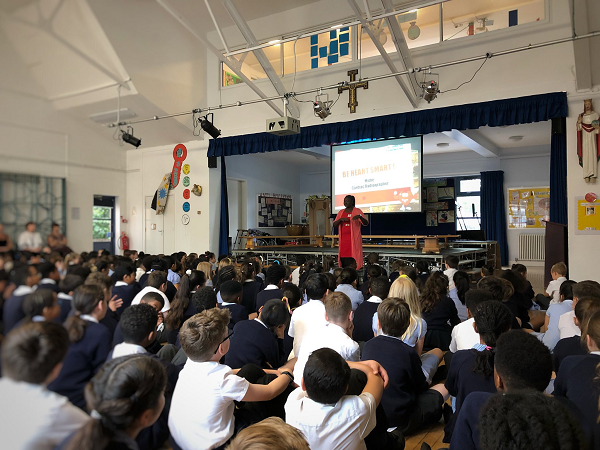New approach to fighting heart disease in east London

A collaboration between Barts Health, the British Heart Foundation and community groups is addressing the worrying prevalence of heart disease in east London.
East London has some of the highest rates of cardiovascular disease (CVD) in the capital and the fifth highest rate of premature death in the country. On average, heart or circulatory disease claims the life of one east London resident every three hours.
The East London Cardiovascular Disease Prevention Group, or ‘ELoPE’ for short, was established in 2016 by Barts Health clinicians, including doctors and nurses, alarmed by a problem they describe as “near pandemic levels.”
Drawing on the expertise from within the Barts Heart Centre at St Bartholomew’s Hospital, the largest cardiac unit in the country, and from universities including UCL and Queen Mary University of London, the team launched a major programme to reduce the burden of heart and vascular disease, including educational talks delivered across City and Hackney, Newham, Tower Hamlets, Waltham Forest and Redbridge.
The Healthy Hearts assemblies, which are currently held online owing to the coronavirus pandemic, were designed with the British Heart Foundation and are delivered by trust staff who volunteer their time to promote the benefits of a healthy and active lifestyle to local primary school children.
“The tragedy is that the most common form of heart disease – coronary atherosclerosis, which leads to heart attacks – is largely preventable by lifestyle adjustments and an awareness of how the disease develops”, says Professor Riyaz Patel (pictured), a consultant cardiologist who helped to establish ELoPE four years ago.
“We know that coronary atherosclerosis starts in early adulthood, sometimes even in late teenage years. It’s vital that habits which put people at greatest risk – smoking, eating unhealthy food and leading a sedentary life – are addressed at an early stage. There’s no better time to start than during school years, particularly at the tail end of primary school when children begin to make food and lifestyle choices that will shape their health for years to come.”
To date, the talks have reached more than 3,700 year six pupils across 42 schools, in some of the most ethnically diverse parts of the UK (around 50% of children in Waltham Forest and more than 70% in Newham and Tower Hamlets do not have English as a first language).
Feedback has been excellent, with pupils, parents and teachers welcoming the opportunity to hear from local healthcare professionals.
Addressing inequalities
The team are acutely aware of the context within which they deliver the talks and the importance of public health, housing, employment and economic factors that drive much of the health inequality in east London.
Dr Mohammed Khanji, a consultant cardiologist at Newham Hospital who leads the schools program says, “changing the environment is very challenging, but at the very least we can empower children with knowledge and habits that can help them to make informed choices whenever they can.”
All clinical staff, regardless of their role, have the opportunity to give a talk and more volunteers are needed from across Barts Health as the number of events increases. The team have recently begun offering education programs to working age adults, through local business and organisations, such as the police and City law firms. Led by consultants from our five hospitals, the sessions reveal how to spot the signs of a heart attack, how they are treated and how people can reduce their risk.
“There is strong appetite from local business for interactive lunchtime webinars where we can reach hundreds of employees in one go”, says Dr Khanji. “There’s no fee, but we do encourage donations, which allows us to run our schools and other outreach projects.”
CPR training
ELoPE is also working with the British Heart Foundation to help secondary school teachers deliver cardiopulmonary resuscitation (or CPR) training to all of their students as part of the curriculum.
Less than one in ten people who suffer a cardiac arrest outside of hospital will survive. Having early CPR available to someone who may have had a cardiac arrest is the most important factor determining survival.
“By supporting teachers to confidently teach CPR, their students will be better equipped to offer lifesaving intervention to their loved ones or even to complete strangers should the worst happen, giving someone the best possible chance of survival”, says Dr Khanji.
Ambitous plans
Despite restrictions in place due to Covid-19, the ELoPE program continues to grow and increase its impact across east London. Riyaz and his colleagues have ambitious plans, which include supporting around 16,000 trust staff in managing their own risk of heart disease, making workplaces healthier and asking healthcare providers across primary and secondary care to sign up to a charter to make every contact count in delivering heart health advice.
Riyaz recognises that ELoPE is a team effort, one he describes as a “coalition of the willing.”
“We couldn’t possibly do this without the support and engagement of our colleagues, patients, partners and the east London community. The model – an acute NHS trust engaging in heart disease prevention whilst also treating the effects of heart disease – is one that can and should be scaled-up across the country”.
“Healthcare organisations have an opportunity to leverage the trust and influence they have as local anchor institutions to make a real impact in supporting their communities to live longer and healthier lives.
“As an east Londoner myself, I’m sadly all too aware of the tragedy of heart disease in this part of the world.”
